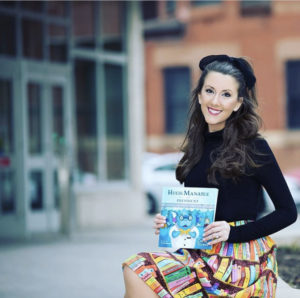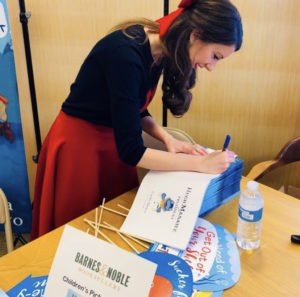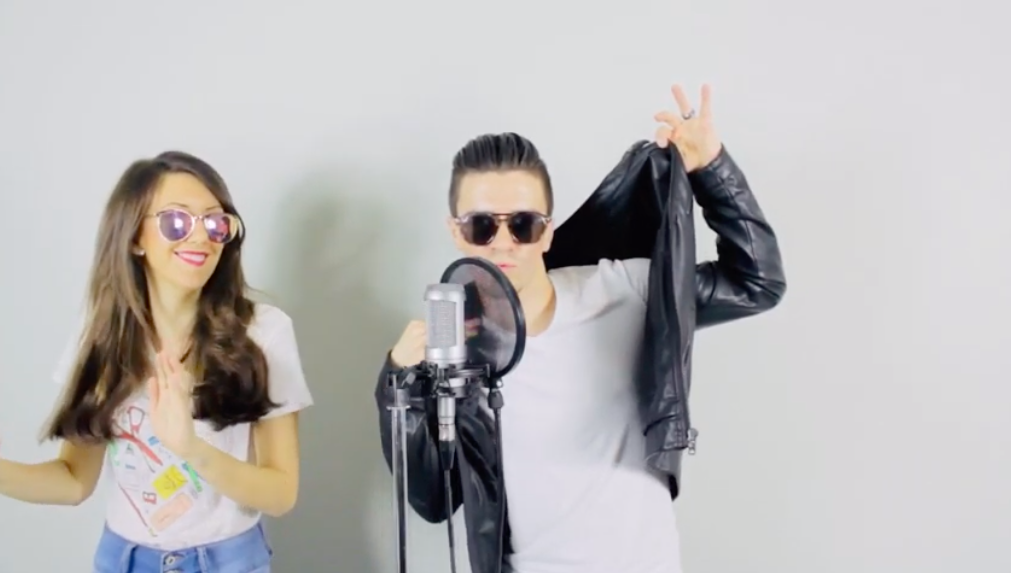IMSE: How long have you been teaching and what is your position at your school?
Carla Siravo: This is my seventh year of teaching and right now I am a K-5 literacy interventionist. I actually didn’t go to school for education, I went to school for psychology because I was really interested in applied behavior analysis.
So, I started out working with students with autism and then became really involved in special education. Because of that, I joined Teach for America to sort of combine my passion for working with special needs students and I really wanted to try to experience working in an urban community.
I joined Teach for America and I sort of fell into literacy intervention. It’s just what was available and what my principal thought I would be good at. I just ended up loving it. It’s interesting because I liked to read before that, but I wouldn’t have considered myself a passionate reader.
I started teaching reading and I just thought it was so cool that I had this unique experience that I could give students the tools to access everything around them. Children would walk around just not having access to things like signs and things that we take for granted. Once you squeeze in a few lessons, then all of a sudden so many things around them start making sense. To me, it was really cool because eventually, I know that’s going to translate to turning into getting older and being able to read the news and things that they need to know about bullies.
IMSE: What were some of the things you based your early instruction on?
CS: I’m actually at a different school now, I started my teaching experience at my Teach for America placement school which was in an urban community. The guided reading program I had there…I realized that it wasn’t really written for my students. The way some of the questions and content were scripted was not really relatable for my students.
I started to notice that some of my reading material was just really pitched to students in suburban communities with a different set of experiences. So that’s when I started to become really interested in different programs.
The one thing I really love about Orton-Gillingham and IMSE is that you don’t need to have gone on a trip to the beach or have a big backyard and a dog to be able to learn the new content. It’s more about using movement, using your body, touching words, interacting with words, and singing words.
You don’t need to have whatever the books say you should have. You just need to have what every person has – your senses – to be able to learn more information. That’s what I thought was just so cool about it.
That was part of the issue with some of those early materials I was using. It was too dependent on that language comprehension side of the equation where students didn’t have the necessary vocabulary background coming into school.
It’s not that they didn’t have vocabulary or that knowledge. It was just a whole set of different experiences.
IMSE: How did you end up finding the IMSE training?
CS: Well, I had a coworker who was IMSE trained and we taught in the same classroom. We would teach in small groups and share the room, and her lessons were so interactive. When I would be doing my planning, a lot of times I would be doing the work along with her students in my head. I just loved how engaging and catchy it was.
It was just so different from the way that I teach, and I knew I would love to be able to do that. So, my supervisor sent another coworker and I and we had the best experience. It wasn’t only just interesting; it was also really fun.
That was over a year ago and we still talk about it – the things that we learned, funny things that happened, cool things that happened. We loved it so much that we talked our supervisor into sending another one of our coworkers.
IMSE: How did the training affect your teaching methods and how you evaluate your students when you went back to school?
CS: I had a basic understanding of the science of reading based on some of my other teacher trainings, but there were a lot of times before that where students would ask me things and I’d have to go look it up or I’d say “Because I said so!”
And then IMSE really answered all of those questions that I had to look up before. I learned the rules for everything and it really all started to click. It’s really changed a lot for them.
The coolest thing about after I had the training was that a lot of my students that I could not figure out or were just really hard to reach, they were the ones who were really successful with the explicit phonics. It was really cool to see a lot of kids who were just generally frustrated having lightbulb moments all the time.
I could tell it was sort of their first experience finally getting things. It had already been explained so many different ways, and it was so cool to see them have so many lightbulb moments in a row. It was amazing to see their faces and watch everything start to click with them. That was so rewarding.
I was honestly shocked at how instantly I started seeing results. I can think of two students in particular I was so worried about. I did not know what to do to get through them. Then as soon as we talked about the rules and the strategies, it was just so clear to them. It started clicking right away, probably about a week after I got back.
IMSE: You are also an author of a children’s book, Hugh Manatee for President. What led you to start writing?
CS: When I joined Teach for America, I had so many new experiences that I was overwhelmed. So, I just started journaling about them to help self-reflect and then eventually I started turning these little journal entries about my students into poetry.
 At the same time, I was also reading so many cute children’s books every day that I started weaving some fictional elements into them and turning the kids that I was writing about into characters like different animals.
At the same time, I was also reading so many cute children’s books every day that I started weaving some fictional elements into them and turning the kids that I was writing about into characters like different animals.
Then it became a really fun creative project for me. I ended up showing them to a few people who convinced me to submit my story to a publishing company.
My book, Hugh Manatee for President, is really about one of my students who had the same experiences that my character had. He was a really compassionate and empathetic person caring about everyone.
The student wanted to run for president of his class and asked me to help him write his speech, which is sort of what happens in the story for Manatee.
IMSE: What was the inspiration behind the music videos you have been making? And what’s the response been like?
CS: I am not a very musical person myself. At school, my lessons are really creative, but I use more interactive movement and tactile experiences. Unfortunately, my students don’t have a lot of the materials I use in the classroom.
By the time they announced that the schools were closed this year, I didn’t see them again. There was no way for them to get all the materials that I usually use in my lessons. So that really freaked me out and I knew I had to get creative with it. I had to find a way to engage them because my students are already prone to get frustrated and struggle when they look at letters because they’re intervention students.
I can’t just send them letters to look at every week because it will overwhelm them, and they’re already in this overwhelming situation where they’re learning from home. I wanted a fun way to explain the rules to parents and I wanted it to be less overwhelming for kids.
I also have these two first-grade students who I teach together. They’re twins who are so musical and anything I taught to them; they would sing it back to me. If I ask them questions, they would sing me the answer. So, I knew that they would be all over it.
I kind of had them in mind and I was thinking about a song I knew that my students would love. Luckily, my husband happens to be a musician and he’s been trying to work from home, but I’ve been over his shoulder all the time.
He’s so sweet and he cares about me and my students so much that he’s just going with it all. I’m really lucky that he’s being generous with his time.
IMSE: On that note, how much work goes into coming up with the concept, lyrics, performing, and editing the song?
CS: The lyrics usually come to me really quickly because I’m thinking about a lesson that I would teach in school. I already teach so much rhyming and I’m always thinking about where to incorporate things like fluency and rhythm all the time. That part comes together really quickly for me.
However, sometimes it’s hard for me to get that across to my husband because I’m a really bad singer. I have one thing in mind and he says, “that’s not what it should sound like.”
Luckily, he takes the time and works with me. Since we’re doing more of them now, he’s getting better at understanding what I’m going for, but that part sort of takes a long time.
Then he does the music and records everything, and that can take a long time. He really does the bulk of the work, so I’m very thankful for that.
That takes several hours and then we always have a lot of fun filming the videos. We do that on weekend nights. We’re just dancing and it’s a fun thing to do since we can’t go out, but it does take a couple hours.
Then I edit the videos, and that’s pretty new for me. I am actually pretty bad with technology, so I’ve just been teaching myself on Google how to use different editing software. It’s cool because now I have that new skill and I feel like I’m getting better at it. It took me a long time in the beginning, but I’m getting faster with it. Overall, it takes a few hours for every song to come together.
IMSE: What’s been the best or most touching response you have gotten?
CS: Oh, I‘ve had so many cool responses. First of all, my students love them. I did one assignment where I sent the students a video and had them send a video back to me with their own song explaining the rules.
They were so funny. I cried watching. They were just so cute and hilarious, and I could tell that they really knew the actual content because they explained it well in their lyrics.
From sharing them on Facebook, I’ve been getting messages from people everywhere – people in Australia and Canada and all over the United States. I’ve had so many moms who say, “I have two kids with dyslexia, and they said they’ve never learned this way and we’ve been singing your songs all day.” It brought them so much joy.
